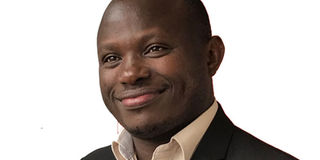Open letter to President on social media tax effect on deaf persons

Mr Murangira is a concerned hearing impaired citizen.
What you need to know:
My request. Mr President, you may need to exempt deaf persons from paying the proposed tax as a measure to promote access to information by people with hearing impairment as WhatsApp and Facebook are the leading sources of information for them.
On June 14, Finance minister Matia Kasaija will be reading Budget for 2018/19 financial year. Earlier on March 12, you wrote ordering him to tax social media, especially WhatsApp and Facebook ‘because of gossip’. He acted and on May 30, the Parliament of Uganda passed the tax of Shs200 (though you had suggested Shs100). This means that every WhatsApp or Facebook user will have to pay a tax of Shs200 everyday!
Mr President, your decision is not inclusive as it did not consider the different needs of your people. As a person with a hearing impairment, I will talk about how the tax on social media is going to affect me and the estimated 1.3 million hearing impaired persons in the country.
First and foremost, Mr President, access to communication and information has remained a big obstacle in mainstreaming deaf persons in different development programmes in the country. Though sign language was recognised in 1995 by including it in the national Constitution, almost nothing has been made to develop and promote the use and respect of sign language in Uganda.
As a result, deaf Ugandans remain cut off in terms of access to information and essential services such as health and education, which is a fragrant abuse of their rights. Most work around sign language has been done by NGOs.
It has been a challenge for the deaf to access educative messages/information on health, education, agriculture, transport, etc. For example, Mr President, you have never used a sign language interpreter or even attempted to make your State-of-the-Nation Address or Budget reading accessible to people with hearing impairment. Thanks to development in ICT, with WhatsApp and Facebook, people with hearing impairment were starting to access information through appropriating their smartphones. Given the fact that majority of deaf persons have never been to school (80 per cent), they hardly read and write so with innovations in WhatsApp and Facebook, they have been making short films in sign language and then share with friends.
The smartphones have strengthened their social networks where literate people with hearing impairment translate public information into short films in sign language and then disseminate them through their ‘deaf’ WhatsApp and Facebook groups for illiterate deaf to access them.
This method is not cheap Mr President. It consumes a lot of MBS (Internet data). However, these people have been ‘funding’ each other in their desperate desire to ensure that their colleagues with hearing impairment, especially those who never went to school, are not left behind the way your government has left them behind.
Through this method, many people with hearing impairment have been following new developments around the world. To them, being on social media platforms is not gossip, but a matter of being informed and getting the much needed information they require to make informed decisions.
The good thing with deaf persons is that they are members of different social groups so a message received on WhatsApp by, for example 10 deaf persons, can easily reach hundreds of them within minutes. I recently sent out a WhatsApp message to seven deaf persons for a meeting and I asked them to invite others, especially those who did not own a phone. The meeting which was to take place in two days had 196 deaf participants!
Having seen WhatsApp and Facebook as a good alternative source of information, people with hearing impairment have formed Facebook and WhatsApp groups aimed at keeping them informed and updated. The most popular ones being The Deaf Parliament of Uganda and Deaf Youth Council of Uganda. It is through these WhatsApp groups that people with hearing impairment got to know about Hepatitis B, which saw hundreds of them flock Kololo for immunisation.
Mr President, the tax on WhatsApp and Facebook will make it expensive for the deaf. As they have been discussing on their platforms, majority are considering abandoning use of social media. This does not only affect them, but it will also affect your government in serving them. It will also create disharmony in the country as deaf persons will feel that your government does not care about them.
This will greatly affect Uganda’s vision of attaining a middle income status by 2040. It will also hinder your efforts to attain agenda 2030, which was passed by World Leaders in 2016 under Uganda’s leadership of the UN General Assembly. Mr President, Deaf persons are already paying VAT, PAYE, Property Tax, etc, but they are not accessing sign language interpretation service, which is very critical for their inclusion in their communities.
Mr President, I end by requesting you to take this matter seriously. You may think about working with UCC and telecommunication companies to improve access to information by deaf persons. You may also need to exempt Deaf persons from paying the proposed tax as a measure to promote access to information by Deaf persons as WhatsApp and Facebook are the leading sources of information for them.
Mr President, it is unfair for you to exempt rich companies from paying taxes but to pass it to the poor Deaf persons whose your government has ignored in education, health and employment.
Mr Murangira is a concerned hearing impaired citizen




